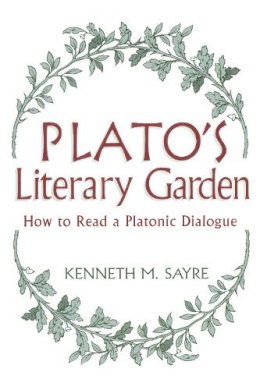
Stock image for illustration purposes only - book cover, edition or condition may vary.
Plato's Literary Garden: How to Read a Platonic Dialogue
Kenneth M. Sayre
€ 39.93
FREE Delivery in Ireland
Description for Plato's Literary Garden: How to Read a Platonic Dialogue
Paperback. This work is designed for students who are undertaking the serious study of Plato for the first time. It aims to provide a method for engaging with the dialogues as actively as the actual participants are engaged, and discusses the significance of the dramatic and literary form of the dialogues. Num Pages: 320 pages. BIC Classification: 1QDAG; 2AHA; 3D; DSBB; DSK; HPCA. Category: (P) Professional & Vocational; (UP) Postgraduate, Research & Scholarly; (UU) Undergraduate. Dimension: 230 x 154 x 24. Weight in Grams: 476.
Plato's dialogues are universally acknowledged as standing among the masterworks of the Western philosophic tradition. What most readers do not know, however, is that Plato also authored a public letter in which he unequivocally denies ever having written a work of philosophy. If Plato did not view his written dialogues as works of philosophy, how did he conceive them, and how should readers view them? In Plato's Literary Garden, Kenneth M. Sayre brings over thirty years of Platonic scholarship to bear on these questions, arguing that Plato did not intend the dialogues to serve as repositories of philosophic doctrine, but instead composed them as teaching instruments.
Product Details
Format
Paperback
Publication date
2002
Publisher
University of Notre Dame Press
Condition
New
Number of Pages
318
Place of Publication
Notre Dame IN, United States
ISBN
9780268038762
SKU
V9780268038762
Shipping Time
Usually ships in 7 to 11 working days
Ref
99-1
About Kenneth M. Sayre
>Kenneth M. Sayre is Professor of Philosophy at the University of Notre Dame and the author of many books and articles, including Plato's Analytic Method and Plato's Late Ontology.
Reviews for Plato's Literary Garden: How to Read a Platonic Dialogue
“Sayre examines with admirable scholarly precision and thoroughness fundamental Platonic themes—the story of recollection, the method of collection and division, the use of paradigms, eros, and dialectic. —International Studies in Philosophy “Kenneth Sayre's book addresses students who are undertaking the serious study of Plato for the first time . . . . Sayre promises students a method for engaging with the dialogues as actively as the actual participants are engaged, and he promises scholars a much needed account of the significance of the dramatic and literary form of the dialogues.” —Ancient Philosophy
